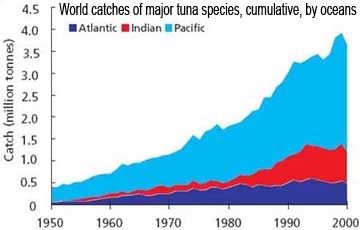How sustainable is your canned tuna? It depends on the retailer
Sainsbury’s has the most sustainable tuna, John West the least
Jeremy Hance, mongabay.com
August 13, 2008
|
|
To aid concerned tuna-lovers, Greenpeace has ranked eight of the top canned tuna retailers in order from most sustainable to least. Canned tuna from John West, the biggest retailer of tuna in the UK, proves to be the worst of the lot, whereas Sainsbury’s is the most environmentally-friendly. In a press release Greenpeace said that Sainsbury’s is “the only tinned tuna brand that is fished using sustainable methods”.
The tuna found in can is most often skipjack tuna. Unlike bigeye, yellowfin, and bluefin tuna, skipjack stocks have shown greater resistance to commercial fishing. Therefore, simply eating slipjack tuna is not a sustainability issue, but the method used to catch the tuna is.
Skipjack is often caught employing FADs or Fish Aggregation Devices. These are flotation devices that draw tuna to them. Unfortunately such devices also draw juvenile bigeye and yellowfin tuna—especially important for propagation in these imperiled species—and they even attract non-tuna species, such as sharks and marine turtles. Of the seven marine turtle species all are considered endangered to some degree, except the flatback turtle which lacks the necessary data. Three of the seven marine turtles are critically endangered. In addition, shark populations are plummeting globally due to fishing practices like FADs. Greenpeace states that for every 10 kilograms of tuna caught by FADs, 1 kilogram is a non-commercial species.
 World catches of major tuna species, cumulative, by oceans, 1950-2000. Graph courtesy of FAO. |
Greenpeace rates John West the worst of tuna retailers, because it has no restrictions on the use of FADs. “John West must stop selling tuna caught in this way,” said David Ritter, Greenpeace UK oceans campaigner. “Thousands of turtles and sharks are killed every year while catching tuna. And John West — the biggest tinned tuna seller in the UK — is currently the worst supplier of the lot.” What makes Sainsbury’s stand-out as a model of environmental sustainability is that it forgoes the use of FADs, instead catching its tuna with poles and lines.
Greenpeace suggests two solutions to unsustainable canned tuna. The first is that retailers become actively aware of the environmental costs of the tuna they carry.
“Unless suppliers and markets take action to source only sustainable products, the industry will simply fish itself and our oceans to death”, said Sari Tolvanen, also of Greenpeace.
The second solution is to cut the total tuna fishing by 50 percent. Tolvanen states that this is the only way “to put the [tuna] fishery on a long-term sustainable and profitable footing.” Such an act would be especially important for bluefin tuna. Both the northern and the southern bluefin tuna are considered critically endangered, yet despite continuous outcries from scientists and conservationists bluefin tuna remains heavily—and often illegally—fished.
Eight major tuna retailers, rated from best to worst by Greenpeace:
- SAINSBURYS: Only sustainable retailer.
- CO-OP: 50 percent of tuna sold is from pole and line.
- MARKS & SPENCER: Good seafood policies, but some tuna fished using FADs.
- ASDA: Admits problem, however uses some FADs and does not label cans according to how fish was caught.
- MORRISONS: Similar to ASDA.
- TESCO: Majority of tuna caught by FADs.
- PRINCES: No restrictions on FADs, does not support marine reserves.
- JOHN WEST: Similar to PRINCES, but in addition fishes areas where stocks of tuna are already greatly depleted.